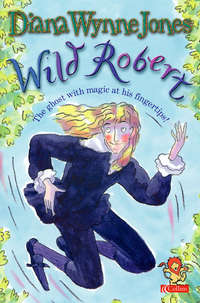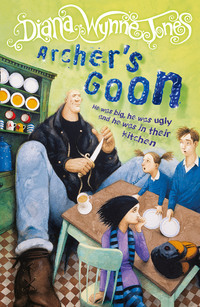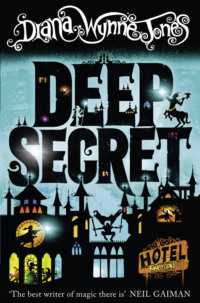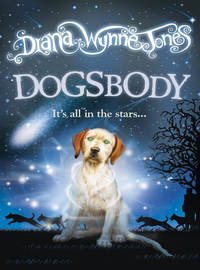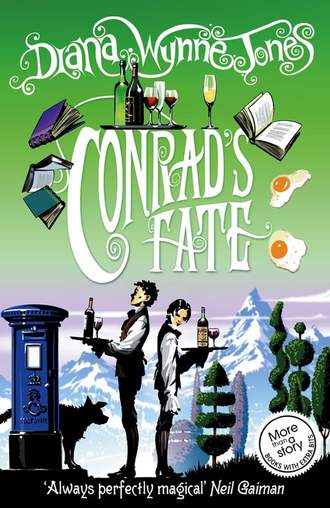
Полная версия
Conrad’s Fate
“Not she,” said Uncle Alfred. “She’s shaken the dust of Stallchester off her feet. And to be brutally frank with you, Fran, I’m not sure I want her back now. Someone that ungrateful would only be a disturbing factor.”
He sighed, dismantled his spell to keep Anthea at home and hired a girl called Daisy Bolger to help in the shop. After that, he was always worrying about how much he had to pay Daisy in order to stop her going to work at the china shop by the cathedral instead. Daisy knew how to get money out of Uncle Alfred much better than I did. Talk about sly! And Daisy always seemed to think I was going to mess up the books when I was in the shop. Once or twice, Count Rudolf up at Stallery worked another big change, and each time Daisy was sure it was me messing the books about. Luckily, Uncle Alfred never believed her.
Uncle Alfred was sorry for me. He would look at me over his glasses in his most worried way and shake his head sadly. “I reckon Anthea going has hit you hardest of all, Con,” he took to saying sadly. “To be brutally frank, I suspect it was your bad karma that caused her to leave.”
“What did I do in my past life?” I asked anxiously.
Uncle Alfred always shook his head at that. “I don’t know what you did, Con. The Lords of Karma alone know that. You could have been a crooked policeman, or a judge that took bribes, or a soldier that ran away, or maybe a traitor to the country – anything! All I know is that you either didn’t do something you should have done, or you did something you shouldn’t. And because of that, a bad Fate is going to keep dogging you.” Then he would hurry away muttering, “Unless we find a way you could expiate your misdeed, I suppose.”
I always felt horrible after these conversations. Something bad almost always happened to me just afterwards. Once I slipped when I was quite high up climbing Stall Crag and scraped the whole front of me raw. Another time I fell downstairs and twisted my ankle, and one other time I cut myself quite badly in the kitchen – blood all over the onions – but the truly nasty part was that, each time, I thought, I deserve this! This is because of my crime in my past life. And I felt horribly guilty and sinful until the scrapes or the ankle or the cut had healed. Then I remembered Anthea saying she didn’t believe people had more than one life, and after that I would feel better.
“Can’t you find out who I was and what I did?” I asked Uncle Alfred, one time after I had been told off by the Headmistress because my clothes were too small. She sent a note home with me about it, but I threw it away because Mum had just started a new book and, anyway, I knew I deserved to be in trouble. “If I knew, I could do something about it.”
“To be brutally frank,” said my uncle, “I fancy you have to be a grown man before you can change your Fate. But I’ll try to find out. I’ll try, Con.” He did experiments in his workroom to find out, but he never seemed to make much headway.
About a year after Anthea left, I got really annoyed with Daisy Bolger, when she tried to stop me looking at the newest Peter Jenkins book. I told her my uncle had said I could, but she just kept saying, “Put it back! You’ll crease it and then I’ll be blamed.”
“Oh, why don’t you go away and work in that china shop!” I said in the end.
She tossed her head angrily. “Fat lot you know! I wouldn’t dream of it. It’s boring. I only say I will to get a decent wage out of your uncle – and he doesn’t pay me half what he could afford, even now.”
“He does,” I said. “He’s always worrying how much you cost.”
“That,” said Daisy, “is because he’s stingy, not because he hasn’t got it. He must be as rich as the Count up at Stallery, almost. This bookshop’s coining money.”
“Is it?” I said.
“I keep the till. I know,” Daisy said. “We’re at the picturesque end of town and we get all the tourists, winter and summer. Ask Miss Silex if you don’t believe me. She does the accounts.”
I was so astonished to hear this that I forgot to be angry and forgot the Peter Jenkins book too. That was no doubt what Daisy intended. She was a very cunning person. But I couldn’t believe she was right, not when Uncle Alfred was always so worried. I began counting the people who came into the shop.
And Daisy was right. Stallchester is a famous beauty spot, full of historic buildings and surrounded by mountains. In summer, we got people to look at the town and play the casino, and hikers who walked in the mountains. In winter, people came to ski. But because we are so high up, we get rain and mist in summer; and in winter there are always times when the snow is not deep enough, or too soft, or coming down in a blizzard, and these are the days when tourists come into the shop in their hundreds. They buy everything, from dictionaries to help with crosswords, to deep books of philosophy, detective stories, biographies, adventure stories and cookery books for self-catering. Some even buy Mum’s books. It only took a few months for me to realise that Uncle Alfred was indeed coining money.
“What does he spend it all on?” I asked Daisy.
“Goodness knows,” she said. “That workroom of his is pretty expensive. And he always buys best vintage port for his Magicians’ Circle. All his clothes are handmade too, you know.”
I almost didn’t believe that either. But when I thought about it, one of the magicians who came to Uncle Alfred’s Magicians’ Circle every Wednesday was Mr Hawkins the tailor, and he often came early with a package of clothes. And I’d helped carry dusty old bottles of port wine upstairs for the meeting, often and often. I just hadn’t realised the stuff was expensive. I was annoyed with Daisy for noticing so much more than I did. But then she was a really cunning person.
You would not believe how artfully Daisy went to work when she wanted more money. She often took as much as two weeks on it – ten days of sighing and grumbling and saying how overworked and hard up she was, followed by another day of saying how the nice woman in the china shop had told her she could come and work there any time. Finally, she would flare up with “That’s it! I’m leaving!” And it worked every time.
Uncle Alfred hates people to leave, I thought. That’s why he let Anthea go to Cathedral School, so she could stay at home and be useful here.
I couldn’t threaten to leave, not yet. You have to stay at school until you are twelve in this country. But I could pretend I was not going to do any more cooking. It didn’t take much pretending, really.
That first time, I went even slower than Daisy. I spent over a fortnight sighing and saying I was sick to my back teeth of cooking. Finally, it was Mum who said, “Really, Conrad, to listen to you, anyone would think we exploited you.”
It was wonderful. I went from simmering to boiling in one breath, and I shouted with real feeling, “You are exploiting me! That’s it! I’m not doing any more cooking ever again!”
Then it was even more wonderful. Uncle Alfred hurried me away to his workroom and pleaded with me. “You know – let’s be brutally frank, Con – your mother’s hopeless with food and I’m worse. But we’ve all got to eat, haven’t we? Be a good boy and reconsider now.”
I looked around at the strange-shaped glass things and shining machinery in the workroom and wondered how much it all cost. “No,” I said sulkily. “Pay someone else to do it.”
He winced. He almost shuddered at the idea. “Suppose I was to offer you a little something to take up as our chef again,” he said cajolingly. “What could I offer you?
I let him cajole for a while. Then I sighed and asked for a bicycle. He agreed like a shot. The bicycle was not so wonderful when it came, because Uncle Alfred only produced one that was second hand, but it made a start. I knew how to do it now.
When winter came, I went into my act again. I refused to cook twice. First I got regular pocket money out of my uncle and then I got skis of my own. In the spring, I did it again and got modelling kits. That summer I got most things I needed. The next autumn I actually made Uncle Alfred give me a good camera. I know this was calculated cunning and quite as bad as Daisy – though I couldn’t help noticing that my friends at school got skis and pocket money as if they had a right to them, and that none of them had to cook for these things, either – but I told myself that my Fate had made me bad and I might as well make use of it.
I stopped the year I was going to be twelve. This was not because I was reformed. It was part of a Plan. You can leave school at twelve, you see, and I knew Uncle Alfred would have thought of that. The rule is that you can go on to an Upper School, but only if your family pays for you. Otherwise you go and find a job. All my friends were going to Upper Schools, most of them to Cathedral like Anthea, but my best friends were going to Stall High. I thought of it as like the school in the Peter Jenkins books. Stall High cost more, but it was supposed to be a terrific place and, best of all, it taught magic. I had set my heart on learning magic with my friends. Living as I did in a house where Uncle Alfred filled the stairway with peculiar smells and the strange buzz of working spells at least once a week, I couldn’t wait to do it too. Besides, Daisy Bolger told me that Uncle Alfred had been to Stall High himself as a boy. How that girl found out these things was something I never knew.
Knowing Uncle Alfred, I knew he would try to keep me at home somehow. He might even be going to sack Daisy and make me work in the shop for nothing. So my Plan was to threaten to stop cooking just near the end of my last term and get him to bribe me with Stall High. If that didn’t work, I thought I would threaten to go and get a job in the lowlands, and then say that I’d stay if I could go to Cathedral School instead.
I worked all this out sitting in my room, staring upwards at Stallery glimmering among the mountains. Stallery always made me wish for all the strange and exciting things that I didn’t seem to have. It made me think that Anthea must have sat in her room making plans in much the same way – except that you couldn’t see Stallery from Anthea’s old room. Mum used it as a paper store now.
Stallery was in the news around then anyway. Count Rudolf died suddenly. People gossiping in the bookshop said he was quite young really, but some diseases took no account of age, did they? “Driven to an early grave,” Mrs Potts said to me. “Mark my words. And the new Count is only twenty-one, they say. His sister’s even younger. They’ll be having to marry soon to preserve the family name. She’ll insist on it.”
Daisy was very interested in weddings. She hunted everywhere for a magazine that might have pictures of the new Count Robert and his sister, Lady Felice. All she found was a newspaper with the announcement of Count Robert’s engagement to Lady Mary Ogworth in it. “Just plain print,” she complained. “No photos.”
“Daisy won’t find pictures,” Mrs Potts told me. “Stallery likes its privacy, it does. They know how to keep the media out of their lives up there. I’ve heard there’s electrical fences all round those grounds, and savage dogs patrolling inside. She won’t want people prying, not she.”
“Who’s she?” I asked.
Mrs Potts paused, kneeling with her back to me on the stairs. “Pass the polish,” she said. “Thanks. She,” she went on, rubbing in polish in a slow, enjoying sort of way, “is the old Countess. She’s got rid of her husband – bothered and nagged him to death, I’ve heard – and now she won’t want anyone to see while she works on the new Count. They say he’s well under her thumb already and bound to be more so, poor boy. She likes all the power, all the money. He’ll marry that girl she’s chosen and then she’ll run the pair of them, you’ll see.”
“She sounds horrible,” I said, fishing for more.
“Oh, she is,” said Mrs Potts. “Used to be on the stage. Caught the old Count by kicking up her legs in a chorus line, I heard. And…”
Unfortunately, Uncle Alfred came rushing upstairs at this point and upset Mrs Potts’ cleaning bucket and Mrs Potts’ nerves along with it. I never got Mrs Potts to gossip about Stallery again. That was my Fate at work there, I thought. But I got a few more hints from Uncle Alfred himself. With his face almost withered with worry, he said to me, “What happens up in Stallery now, eh? It could be even worse. I mention no names, but someone’s very power hungry up there. I dread the next set of changes, Con.”
He was so worried that he telephoned his Magicians’ Circle and they actually met on a Tuesday, which was almost unheard-of. After that, they met on Tuesdays and Wednesdays and I helped carry up twice the number of dusty wine bottles every week.
And those weeks slowly passed, until the dread day arrived when the Headmistress came and gave everyone in the top class a School Leaver’s Form. “Take this home to your parent or guardian,” she said. “Tell them that if they want you to leave school at the end of this term, they must sign Section A. If they want you to go on to an Upper School, then they sign Section B. Get them to sign tonight. I want all these forms back tomorrow without fail.”
I took my form home to the shop, prepared for battle and cunning. I went in through the back yard and straight upstairs to Mum. My plan was to get her to sign Section B before Uncle Alfred even knew I’d got the form.
“What’s this?” Mum said vaguely as I pushed the yellow paper in front of her typewriter.
“School Leaver’s Form,” I explained. “If you want me to go on at school you have to sign Section B.”
She pushed her hair back distractedly. “I can’t do that, Conrad, not when you’ve got a job already. And at Stallery of all places. I must say I’m really disappointed in you.”
I felt as if the whole world had been pulled out from under me like a carpet. “Stallery!” I said.
“If that’s what you told your uncle, yes,” my mother said. And she took the form and signed Section A with her married name. F. Tesdinic. “There,” she said. “I wash my hands of you, Conrad.”
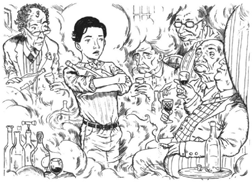
Chapter Three
I stood there, feeling utterly let down. I didn’t know what to do, or what to think. Then, when I next caught up with myself, I was racing downstairs, waving the School Leaver’s Form. I rushed into the shop, where Uncle Alfred was standing behind the pay desk, and I wagged the form furiously in his face.
“What the hell do you mean by this?” I pretty well shrieked at him.
A lot of customers whirled round from the shelves and stared at me. Uncle Alfred looked at them, blinked at me and said to Daisy, “Do you mind taking over here for a moment?” He dodged out from behind the desk and seized my elbow. “Come up to my workroom and let me explain.”
He more or less dragged me from the shop. I was still flapping the form with my free hand and I think I was shouting too. “What do you mean – explain?” I screamed as we went upstairs. “You can’t do this to me! You’ve no right!”
When we reached the workroom, Uncle Alfred shoved me inside into a strong smell of recent magic and shut the door behind both of us with a clap. He straightened his glasses, which I had knocked crooked. He was panting and he looked more worried than I had ever seen him, but I didn’t care. I opened my mouth to shout at him again.
“No, don’t, Con,” Uncle Alfred said earnestly. “Please. I’m doing the best I can for you. Honestly. It’s your Fate – this wretched bad karma of yours – that’s the problem, see.”
“What’s that got to do with anything?” I demanded.
“Everything,” he said. “I’ve been doing a lot of divining about you and it’s even worse than I realised. Unless you put right what you did wrong in your previous life – and put it right now – you are going to be horribly and painfully dead before the year’s out.”
“What?” I said. “I don’t believe you!”
“It’s true,” he assured me. “The Lords of Karma will just scrap you and let you try again when you next get reborn. They’re quite ruthless, you know. But I don’t ask you to believe me just like that. I’d like you to come to the Magicians’ Circle this evening and see what they say. They don’t know you, I haven’t told them about you, but I’m willing to bet they’ll spot this karma of yours straight off. To be brutally frank with you, it’s round you in a black cloud these days, Con.”
I felt terrible. My mouth went dry and my stomach shook, in wobbly waves. “But,” I said, and found my voice had gone down to a whisper, “but what’s it got to do with this?” I tried to flourish the Leaver’s Form at him again, but I could only manage a feeble flap. My arm had gone weak.
“Ah, I wish you’d come to me first,” said my uncle. “I’d have explained. You see, I’ve discovered what you did wrong. There was someone in your last life the Lords of Karma required you to put an end to. And you didn’t. You lost your nerve and let them go free. And this person got reborn and continued his evil ways in this present life too…”
“But I still don’t see—” I began.
He held up a hand to stop me. It was shaking. He seemed to be shaking with worry all over. “Let me finish, Con. Let me go on. Since I discovered what caused your Fate, I’ve done every kind of divination to find out who this person is that you didn’t put an end to. It’s been really difficult – I don’t have to tell you how the magics up at Stallery interfere with spells down here – but it was pretty definite even so. It’s someone up at Stallery, Con.”
“You mean it’s the new Count?” I said.
“I don’t know,” said my uncle. “It’s one of them up there. Someone up at Stallery has a lot of power and is doing something really bad, and they’ve got the exact pattern of this person you should have done away with last time. That’s all I can find out, Con. Look on the bright side. We know where to find him or her. That’s why I arranged for you to get a job up at Stallery.”
“What kind of a job?” I asked.
“Domestic,” said Uncle Alfred. “The kind of thing you’re used to really. The steward up there – butler, whatever – is a Mr Amos and he’s reckoning to take on some school leavers shortly, to train up as servants to the new Count. Day after the end of term, he’ll be interviewing a whole bunch of you. And he’ll take you, Con, never fear. I’ll put a really good spell on you so he’ll have no choice. You don’t need to worry about getting the job. And you’ll be right in the middle of things then, cleaning boots and running errands, and you’ll have ample opportunity to seek out the person responsible for this terrible karma you carry…”
I thought, Cleaning boots! And nearly burst into tears. My uncle went on talking, nervously, persuasively, but I just couldn’t attend any more. It wasn’t simply that my careful Plan had been no use at all. It was more that I suddenly saw where the Plan had been leading me. I hadn’t admitted it to myself before, but I knew now – I knew very fiercely – that what I wanted was to be like Anthea, to leave the bookshop, leave Stallchester, go somewhere quite different and make a career of some kind. I hadn’t actually thought what career, until then, but now I thought of flying an aircraft, becoming a great surgeon, being a famous scientist, or perhaps, best of all, learning to be the strongest magician in the world.
It was like peeping past a door that was just slamming in my face. I could do so many interesting things if I had the right education. Instead, I was going to spend my life cleaning boots.
“I don’t want to!” I blurted out. “I want to go to Stall High!”
“You haven’t listened to what I’ve been telling you,” Uncle Alfred said. “You’ve got to get this evil Fate of yours cleared away first, Con. If you don’t, you’ll die in agony before the year’s out. Once you’ve gone up to Stallery, found out who this person is and done away with him or her, then you can do anything you want. I’ll arrange for you to go to Stall High then like a shot. Of course I will.”
“Really?” I said.
“Really,” he said.
It was like that door softly swinging open again. True, there was an ugly doorstep in the way labelled Bad Karma, Evil Fate, but I could step over that. I found myself letting out a long, long sigh. “All right,” I said.
Uncle Alfred patted my shoulder. “Good lad. I knew you’d see reason. But I don’t ask you to take my word alone. Come to the Magicians’ Circle tonight and see what they have to say. All right now?” I supposed I was. I nodded. “Then could I get back to the shop?” he said. “Daisy hasn’t the experience yet.”
I nodded again. But as he pushed me out on to the stairs, I had a thought. “Who’s going to do the cooking with me gone?” I asked. I was surprised not to have thought of this before.
“Don’t worry about that,” my uncle said. “We’ll hire Daisy’s mother. Daisy’s always telling me what a good cook her mum is.”
I stumbled away up to my room and stared up at Stallery twinkling out of its fold in the mountains. My mind felt like someone in the dark, stumbling about among huge pieces of furniture with sharp corners on them. I kept barking myself on the corners. No Stall High unless I went and cleaned boots in Stallery – that was one corner. The Lords of Karma scrapped you if you were no good – that was another. A person up there among those glinting windows was so wicked they had to be done away with – that was another—and I had to deal with the person now because I’d been too feeble to do it in my last life – that was yet another. Then I barked my mind on the most important corner of the lot. If I didn’t do this, I’d die. It was this person or me, him or me.
Him or me, I kept saying to myself. Him or me.
Those words were going through my head while I helped Uncle Alfred carry the bottles of port up to his workroom that evening. I had to back into the room because I had two bottles in each hand.
“Dear me,” someone said behind me. “What appalling karma!”
Before I could turn round, someone else said, “My dear Alfred, did you realise that your nephew carries some of the blackest Fate I’ve ever seen?”
All the magicians of the Circle were there, though I hadn’t heard them arrive. Two of them were smoking cigars, filling the workroom with strong blue smoke, which made the place look a different shape and size somehow. Instead of the usual workbench and glass tubes and machinery, there was a circle of comfortable armchairs, each with a little table beside it. There was another table in the middle loaded with bottles, wineglasses and several decanters.
I knew most of the people sitting in the armchairs at least by sight. The one pouring himself a glass of rich red wine was Mr Seuly, the Mayor of Stallchester, who owned the ironworks at the other end of town. He passed the decanter along to Mr Johnson, who owned the ski runs and the hotels. Mr Priddy, beside him, ran the casino. One of those smoking a cigar was Mr Hawkins the tailor and the other was Mr Fellish who owned The Stallchester News. Mr Goodwin, beyond those, owned a big chain of shops in Stallchester. I wasn’t quite sure what the others were called, but I knew the tall one owned all the land round here, and that the fat one ran the trams and buses. And there was Mr Loder the butcher, helping Uncle Alfred uncork bottles and carefully pour wine into decanters. The thick nutty smell of port cut across the smell of cigars.


